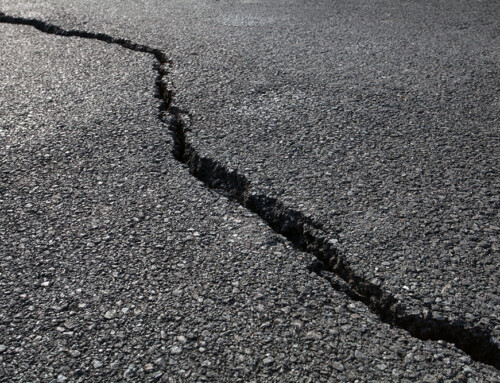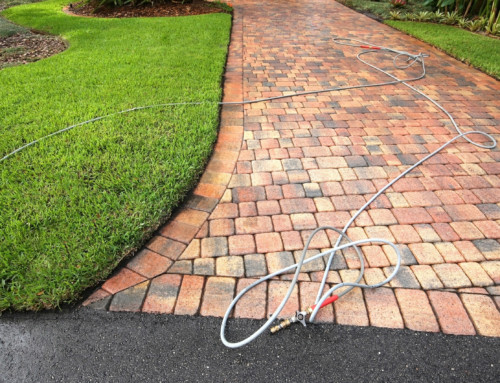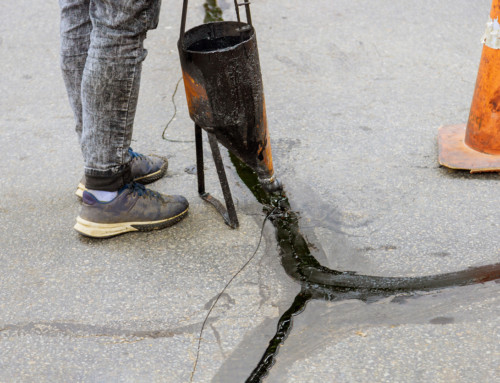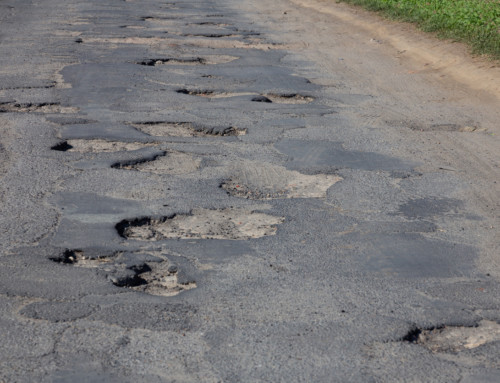A pothole is a form of asphalt failure caused by a combination of water and traffic pressure. Potholes are a reality of life in Canada and across the globe. While it is nearly impossible to entirely prevent potholes from forming, understanding their causes can help you minimize their effects.

What Is Asphalt?
To truly understand what causes potholes, it is important to first understand what asphalt is made out of. An extremely common and sustainable paving material, asphalt consists of aggregates, binders, and fillers. The aggregates vary, but are generally composed of gravel, sand, or rocks ground to different consistencies. Binders such as bitumen give asphalt a remarkable adhesive quality, holding it together and making it easy to pour and spread. Asphalt is normally heated before pouring to give it a longer workable time and to allow it to cure as it slowly cools.
What Is a Pothole?
A pothole is an unevenly cracked area where the asphalt is washed out or worn away. Potholes tend to worsen over time, and can range in diameter from a few inches to a few feet, with a depth up to several inches. Potholes make driveways and roads bumpy, and can even damage your vehicle’s tires and alignment.
How Do Potholes Form?
As vehicles pass across asphalt, the friction from the tires causes it to expand. Over time, this can lead to surface cracks in the asphalt. When it rains or snows, water seeps into those cracks. That water can gradually erode the asphalt from underneath, causing larger cracks and divots to form.
Our cold Canadian winters add to the problem because water can actually freeze inside the cracks. The expansion of water into ice pushes out the asphalt, often somewhat violently. When the water melts and contracts, there is nothing left in the space that the ice once occupied. This speeds up the erosion cycle, often causing large divots to appear quickly.
Whether the divot was left by freezing and thawing, or simply eroded over time, the end result is the same—a gap underneath the surface pavement. Then, when a vehicle drives over the divot, the weight pushes down on the divot, allowing it to collapse into a hole. As more vehicles drive over the pothole, the cracking worsens and the hole gets bigger.
How To Fix Potholes
Fortunately, potholes are relatively easy to fix. In the winter, an emergency patch repair is performed. This fix uses something called a cold patch, which can be applied at any temperature. It will fill the hole and prevent further damage, but is not considered a long-term solution. When the weather warms up, it is usually best to replace the cold patch with a hot asphalt mix.
In a hot mix repair, the pothole is thoroughly cleaned and the edges are evened out, and then hot asphalt is carefully poured and worked to create an even seam with the existing asphalt. As the product cools and cures, it forms a tight seal. This is the preferred method for a long term repair, but it cannot be performed in the winter. The reason for this is that the hot asphalt must be maintained at a specific working temperature. Winter weather causes it to cool and harden too quickly.
How to Prevent Potholes?
It is not possible to prevent all potholes from occurring, but a well-designed plan can minimize the risk for pothole development. An experienced asphalt contractor can assess the site and make needed corrections for proper drainage as the asphalt is laid. It is also important to create just the right mix of air pockets within the asphalt to give water that seeps in a place to go when it freezes and expands. Finally, choosing a high-quality asphalt mix can improve the durability and make it less likely for cracks to turn into potholes.
Regular inspection is also important. Take a good look at your asphalt periodically. If you notice cracks starting to form, address them immediately rather than allowing them to worsen. Also look for areas of standing water, which signal improper drainage. With regular inspection and maintenance, the number and severity of potholes can be significantly diminished.
Based in Abbotsford, Topwest Asphalt also serves Langley, Chilliwack, Mission, and Maple Ridge. Are you ready to start your next asphalt project with a team you can count on to do the job right, on time, and on budget? We invite you to call Topwest Asphalt today at 1-800-ASPHALT to discuss your project and schedule an estimate. We look forward to working with you!





